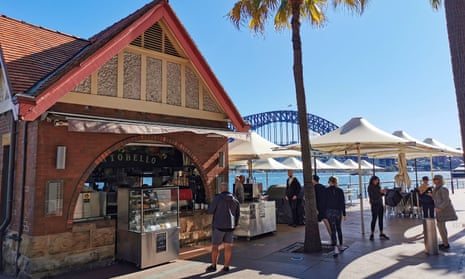Australians are increasingly comfortable with governments easing restrictions designed to slow the spread of coronavirus, but people surveyed in the latest Guardian Essential poll also want lockdowns and travel bans reinstated if infections surge.
The latest poll comes as the treasurer, Josh Frydenberg, will use an economic update to parliament on Tuesday to quantify the gains to gross domestic product if governments roll out the full, three stage, agreement to end the lockdowns signed off by the national cabinet last week. Frydenberg will report the GDP gains from easing coronavirus restrictions nationally will be $9.4bn a month.
The treasurer says implementing stage one of the easing – which involves the reopening of retail outlets, permits cafes and restaurants to seat 10 patrons rather than just offer takeaway, and also encompasses the opening of outdoor gyms, playgrounds and skate parks and the return of schools – will boost GDP by $3.1bn.
The Morrison government over the past week has been ramping up public focus on the economic and fiscal cost of the pandemic restrictions. Frydenberg will note the end of lockdowns will see 850,000 Australians return to work. With individual states in control of the timetable for easing restrictions, Tuesday’s economic statement will break down the employment gains by state of returning to business-as-usual, and also quantify the GDP gains by state.
Australia’s two most populous states, New South Wales and Victoria, are moving more slowly than other jurisdictions because they have had higher numbers of infections. The GDP gains for NSW of implementing all three stages would be $3.1bn and in Victoria, the gain would be $2.2bn. In employment terms, NSW would see 279,550 jobs return over the three stages, and Victoria 216,085 jobs.
While Morrison has been careful not to inflame relations within the national cabinet, a number of Victorian Liberals have used the resumption of federal parliament to blast Daniel Andrews for hastening slowly on dismantling restrictions.
With Australia moving to a period of easing restrictions, concern about the threat of the virus increased in this week’s Guardian Essential survey. 49% of respondents say they are quite concerned, compared with 46% last week. But people remain satisfied with both federal and state government handling of the crisis.
The latest poll of 1,067 respondents shows a majority of Australians are comfortable with the broad direction set by governments last Friday. Only a quarter of respondents now oppose an easing of the social distancing rules, compared with half the sample at the end of April.
But the survey also points to nervousness about the consequences. It shows 77% of people would support restricting travel to places if there are new clusters of infections. More than half of respondents, 67%, would also support increasing fines for people found to be breaching remaining restrictions, and 63% would support a return to restrictions enforcing physical distancing and closing workplaces nationwide if there was a new surge of cases.
Respondents over the age of 55 are more likely to support a snapback to restrictions than the cohort between 18 and 34.
Australians also remain cautious about the CovidSafe app, which is part of the government’s surveillance toolkit to trace recent contacts in the event people become infected with coronavirus. There are now more than five million registered users. Only 38% of the sample would support making downloading the app mandatory in the event there are new clusters of infections.
While just over half the sample (55%) agrees the CovidSafe app would help limit the spread of Covid-19, less than half the group surveyed agrees that they are confident the government will adequately protect any data it collects (45%) and not misuse that data (44%). Just under half the sample, 47%, express concern about the security of their personal data if they download the app.
A majority of the sample would favour a reduction in the number of temporary migrant worker visas permitted in Australia after the Covid-19 outbreak. The shadow home affairs minister, Kristina Keneally, last week called for a reduction in temporary migration post-pandemic.
Expanding on a warning in January about the risk of an underclass, Keneally wrote in a recent opinion piece Australia’s “increasing reliance” on “cheap supply of overseas, temporary labour” undercuts wages “for Australian workers and takes jobs Australians could do”.
Keneally’s position is supported by 67% of respondents. Women, Coalition voters, voters over the age of 55, and voters who support someone other than the major parties were more favourably disposed to the idea than men, voters under 34, and Greens supporters.
Australians have mixed views about temporary migration. More than half the sample, 57%, say temporary migrants support the economy by spending their money in Australia, but 54% say employers should hire Australian citizens where they can, even if they’re not as skilled as candidates who are temporary migrants.
More than half, 52%, say they agree with the statement that if temporary migrants pay the same taxes as Australian citizens, they should be entitled to the same government support. Just under half, 48%, say without temporary migrants, Australia would face skill shortages, and 41% say Australia would be better off with fewer temporary migrants.
The error margin in the survey is plus or minus 3%.
